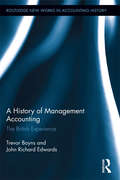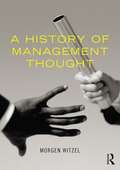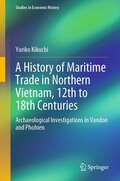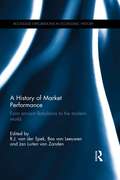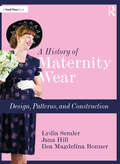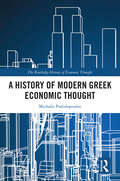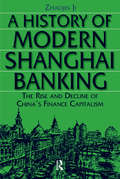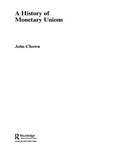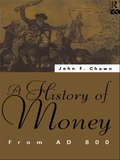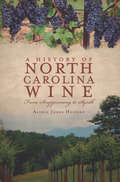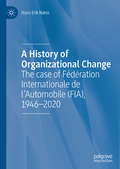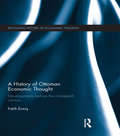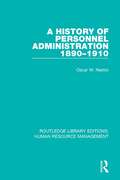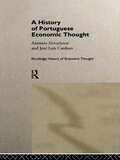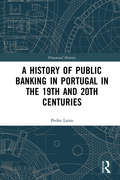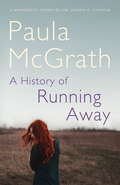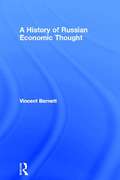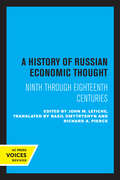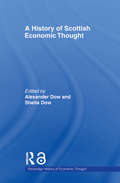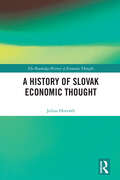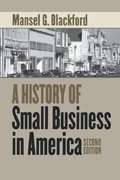- Table View
- List View
A History of Macroeconomics from Keynes to Lucas and Beyond
by Michel De VroeyThis book retraces the history of macroeconomics from Keynes's General Theory to the present. Central to it is the contrast between a Keynesian era and a Lucasian - or dynamic stochastic general equilibrium (DSGE) - era, each ruled by distinct methodological standards. In the Keynesian era, the book studies the following theories: Keynesian macroeconomics, monetarism, disequilibrium macroeconomics (Patinkin, Leijongufvud and Clower), non-Walrasian equilibrium models, and first-generation new Keynesian models. Three stages are identified in the DSGE era: new classical macroeconomics (Lucas), RBC modelling, and second-generation new Keynesian modeling. The book also examines a few selected works aimed at presenting alternatives to Lucasian macroeconomics. While not eschewing analytical content, Michel De Vroey focuses on substantive assessments, and the models studied are presented in a pedagogical and vivid yet critical way.
A History of Management Accounting: The British Experience (Routledge New Works in Accounting History)
by Richard Edwards Trevor BoynsThere is growing interest in the history of accounting amongst both accounting practitioners and accounting academics. This interest developed steadily from about 1970 and really ‘took off’ in the 1990s. However, there is a lack of texts dealing with major aspects of accounting history that can be used in classrooms, to inform new researchers, and to provide a source of reference for established researchers.The great deal of research into cost and management accounting in Britain published in academic journals over the last twenty years–including the authors' own contributions–makes The History of Cost and Management Accounting an essential contribution to the field.
A History of Management Thought
by Morgen WitzelFor the past three thousand years people have been thinking about the problems of management. This book shows how thinking about management has evolved and changed. It shows how changing social, political and technological forces have challenged people to think about management in new ways, and how management thinkers have responded. Sometimes their responses missed the mark and occasionally, great ideas about management failed to be picked up and were lost along the way. Sometimes, truly original and creative, even world-changing ideas appeared. Following key currents in management thought from the origins of civilization to the present day, the book begins in the ancient world, when people were wrestling with the problems of organization and leadership. It continues through the Middle Ages, east and west, as people pondered on how to manage risk and think strategically, and on the role of business in society. It shows how the Industrial Revolution led to the emergence of scientific management, and how political and social events of the twentieth century shaped management thinking right up to the present day. From the pyramids to Facebook, from military strategy to managing for sustainability, A History of Management Thought tells the fascinating story of how management thinking has changed, shifted, evolved and developed down through the centuries. Students taking classes in the history of management thought will find this text to be the perfect accompaniment to their studies and will be a captivating read for anyone else.
A History of Management Thought
by Morgen WitzelOf all the sciences and social sciences, management is the one that most deliberately turns its back on the past. Yet management as we know it today did not spring into life fully formed. Management has more than just a present; it also has a past, and a future, and all three are inextricably linked. This book charts the evolution of management as an intellectual discipline, from ancient times to the present day. Contemporary management challenges, including sustainability, technology and data, and legitimacy are analysed through an historical lens and with the benefit of new case studies. The author helps readers understand how the evolution of management ideas has interacted with changes in society. By framing management's history as one of challenge and response, this new edition is the perfect accompaniment for students and scholars seeking meaningful study in the business school and beyond. Essential reading as a core textbook in management history, the book is also valuable supplementary reading across the humanities and social sciences.
A History of Maritime Trade in Northern Vietnam, 12th to 18th Centuries: Archaeological Investigations in Vandon and Phohien (Studies in Economic History)
by Yuriko KikuchiThis book analyzes the role of Đại Việt (Vietnam) in the maritime Asian trading network of the thirteenth through the eighteenth centuries as it systematically integrates the results of archaeological investigations. The first half of the book consolidates reports from excavations conducted at Vân Đồn and Phố Hiến, trading ports of Đại Việt, incorporating sophisticated archaeological techniques distinctive of Japan in the presentations of the data. These are accompanied by precise scale drawings, detailed classifications, and quantitative analyses of unearthed artifacts. The latter half of the book discusses the materials discovered in archaeological investigations, specifically ceramics and coins, in terms of the relations among sites and networks of production, distribution, and consumption, from a broader Asian geohistorical perspective. To this end, the diplomatic policies and trading activities of each era in Vietnam are discussed, integrating the results of archaeological investigations with studies of historical documents. Expanding beyond Vietnam, results of the archaeological investigations in other maritime Asian countries, such as Japan, Indonesia, Laos, and the Philippines, are introduced, to inform a comparative study that combines all such data from both archaeology and history in a single volume as materials for broader discussion. This book is expected to contribute to international academic discourse on the history of maritime Asia and help open a new phase of scholarly endeavor in this field.
A History of Market Performance: From Ancient Babylonia to the Modern World (Routledge Explorations in Economic History)
by Jan Luiten van Zanden Bas Van Leeuwen R.J. van der SpekThis exciting new volume examines the development of market performance from Antiquity until the dawn of the Industrial Revolution. Efficient market structures are agreed by most economists to serve as evidence of economic prosperity, and to be prerequisites for further economic growth. However, this is the first study to examine market performance as a whole, over such a large time period. Presenting a hitherto unknown and inaccessible corpus of data from ancient Babylonia, this international set of contributors are for the first time able to offer an in-depth study of market performance over a period of 2,500 years. The contributions focus on the market of staple crops, as they were crucial goods in these societies. Over this entire period, all papers provide a similar conceptual and methodological framework resting on a common definition of market performance combined with qualitative and quantitative analyses resting on new and improved price data. In this way, the book is able to combine analysis of the Babylonian period with similar work on the Roman, Early-and Late Medieval and Early Modern period. Bringing together input from assyriologists, ancient historians, economic historians and economists, this volume will be crucial reading for all those with an interest in ancient history, economic history and economics.
A History of Maternity Wear: Design, Patterns, and Construction
by Lydia Semler Jana Hill Ilea Magdelina BonnerA History of Maternity Wear: Design, Patterns, and Construction explores pregnancy clothing worn throughout the decades, providing historical information, images, and patterns. Filled with photos showing extant attire, with intricate details and sample patterns that can be recreated to scale, this book examines how maternity clothes were constructed, provides historical context, and aids readers in designing their own maternity garments. Each chapter includes examples of commonly worn maternity styles from a number of regions of the English-speaking world, with information from the United States, Britain, Australia, and Canada. The book concludes with a chapter on historically accurate underpinnings from the 17th century to the present day. A History of Maternity Wear: Design, Patterns, and Construction is written for costume professionals looking to research historically accurate characters and costumes for production, as well as fashion historians and costume enthusiasts.
A History of Maternity Wear: Design, Patterns, and Construction
by Lydia Semler Jana Hill Ilea Magdelina BonnerA History of Maternity Wear: Design, Patterns, and Construction explores pregnancy clothing worn throughout the decades, providing historical information, images, and patterns.Filled with photos showing extant attire, with intricate details and sample patterns that can be recreated to scale, this book examines how maternity clothes were constructed, provides historical context, and aids readers in designing their own maternity garments. Each chapter includes examples of commonly worn maternity styles from a number of regions of the English-speaking world, with information from the United States, Britain, Australia, and Canada. The book concludes with a chapter on historically accurate underpinnings from the 17th century to the present day.A History of Maternity Wear: Design, Patterns, and Construction is written for costume professionals looking to research historically accurate characters and costumes for production, as well as fashion historians and costume enthusiasts.
A History of Modern Greek Economic Thought (The Routledge History of Economic Thought)
by Michalis PsalidopoulosTracing the evolution of economic ideas in the context of the economic history and economic policy issues in Greece, this book examines the history of modern Greek economic thought from the War of Independence from Ottoman rule in 1821 until the present.The book explores how native, religious-oriented economic thought was secularized and merged with different economic discourses during successive historical periods. It traces how the dissemination of French and German economic thought in the 19th century was followed by British and US influences in the 20th century. The institutionalization of economics as a discipline in the 1920s and its internationalization after 1971, with their effects on the emergence of modern mainstream and heterodox thought, are also discussed. Finally, reference is made to contemporary Greek economic thought in the frame of European Union economic thinking.This book will be of interest to readers in the history of economic thought, economic history, intellectual history, Greek history, and modern European history more broadly.
A History of Modern Shanghai Banking: The Rise and Decline of China's Financial Capitalism (Studies On Modern China Ser.)
by Ji ZhaojinAs the center of capitalism in China, Shanghai banking provides a unique perspective for assessing the impact of the changes from financial capitalism to socialist planning banking in the early 1950s, and for evaluating the reform of China's banking system since the 1980s. This book offers a comprehensive history of Shanghai banking and capital markets from 1842 to 1952, and illustrates the non-financial elements that contributed to the revolutionary social and financial changes since the 1950s, as well as financial experiences that are significant to China's economic development today. The book describes the rise and fall of China's traditional native banks, the establishment of foreign banks, and the creation of modern state banks, while focusing on the colorful world of banking, finance, and international relations in modern Shanghai. It assesses the Chinese government's intervention in banking and finance during the Qing dynasty and the Republican era, as well as the concept of state capitalism after the establishment of the People's Republic. The author examines various modern-style Chinese banks through fascinating stories of Shanghai bankers. In addition, she provides detailed coverage of market-oriented international trade, banking associations, the conflicts between state and society, the government involvement in business, the management of foreign exchange, joint venture banks, wartime banking and finance, hyperinflation, corruption, and banking nationalization.
A History of Monetary Unions (Routledge International Studies In Money And Banking Ser. #Vol. 21)
by John F ChownIn this comprehensive historical overview, the author writes about monetary unions with an admirable completeness and covers such themes as:*The Gold Standard*Monetary Unions in Countries and Areas from Latin America to The British Empire to Japan and Korea with many in between*EMU and its Policy Ramifications*the CFA Franc Zone in the former Frenc
A History of Money: From AD 800
by John F ChownThis book presents a detailed and surprising history of money from Charlemagne's reform in approximately AD800 to the end of the Silver Wars in 1896. It also summarizes twentieth century developments and places them in their historical context.
A History of North Carolina Wine: From Scuppernong to Syrah (American Palate)
by Alexia Jones HelsleyTake a journey through the long and exciting history of North Carolina grapes and vines. The state's native grapes grew with a wild abandon that uniformly impressed early explorers. Wine production, however, is another story--one with peaks and valleys and switchbacks. Alexia Jones Helsley recounts a tale of promise that was long unfulfilled, of disappointments and success and of competing visions and grapes. These pages speak to those intrigued by the romance of the native muscadines, appreciative of the complex varieties of North Carolina wine and fascinated by the enduring drama of human beings and their dreams. In the Old North State, the highly acclaimed vineyards of today have deep roots in the state's past.
A History of Organizational Change: The case of Fédération Internationale de l’Automobile (FIA), 1946–2020
by Hans Erik NæssThis book is the first independent exploration of the Fédération Internationale de l’Automobile’s (FIA) institutional history. Virtually unexamined compared with similar institutions like the FIFA and the IOC, the FIA has nevertheless changed from being a small association in 1904 to becoming one of the world’s most influential sport governing bodies. Through chronologically organised chapters, this book explains how the FIA manages to link together motorsport circuses like Formula 1 with the automotive industry and societal issues like road safety and environmental sustainability. In an exciting narrative spanning seven decades, it reviews the FIA’s organisational turning points, governing controversies, political dramas and sporting tragedies. Considering the FIA to be a unique type of hybrid organisation characterised by what the author calls ‘organisational emulsion’, this case study contains theoretical innovations relevant to other studies of sport governing bodies. It makes an empirically grounded contribution to the research fields of institutional logics, historical sociology and sport governance.
A History of Ottoman Economic Thought: Developments Before the Nineteenth Century (The Routledge History of Economic Thought)
by Fatih ErmişThe Ottoman Empire (1299-1923) existed at the crossroads of the East and the West. Neither the history of Western Asia, nor that of Eastern Europe, can be fully understood without knowledge of the history of the Ottoman Empire. The question is often raised of whether or not economic thinking can exist in a non-capitalistic society. In the Ottoman Empire, like in all other pre-capitalistic cultures, the economic sphere was an integral part of social life, and elements of Ottoman economic thought can frequently be found in amongst political, social and religious ideas. Ottoman economic thinking cannot, therefore, be analyzed in isolation; analysis of economic thinking can reveal aspects of the entire world view of the Ottomans. Based on extensive archival work, this landmark volume examines Ottoman economic thinking in the classical period using three concepts: humorism, circle of justice and household economy. Basing the research upon the writings of the Ottoman elite and bureaucrats, this book explores Ottoman economic thinking starting from its own dynamics, avoiding the temptation to seek modern economic theories and approaches in the Ottoman milieu.
A History of Personnel Administration 1890-1910 (Routledge Library Editions: Human Resource Management)
by Oscar W. NestorThis study, first published in 1986, examines and evaluates the personnel techniques and activities that were characteristic of one period in American industrial life. In later years these techniques and activities came to be known as personnel management or personnel administration. By these terms is meant the policies, procedures, and programs that were introduced by companies for the purpose of bringing about constructive and harmonious relationships between management and its own employees. This title will be of interest to students of business studies and human resource management.
A History of Portuguese Economic Thought (The Routledge History of Economic Thought)
by Antonio Almodovar Jose Luis CardosoA History of Portuguese Economic Thought offers the first account in English of the development of economic thought in Portugal. The authors adopt a comparative approach to analyse how economic doctrine, theories and policies have been disseminated and assimilated by Portuguese economists in different periods. They assess the influence on Portuguese economic thought of major economists such as Adam Smith, Keynes and Hayek.
A History of Professional Economists and Policymaking in the United States: Irrelevant genius (Perspectives in Economic and Social History)
by Jonathan S. FranklinOver the course of the twentieth century, professional economists have become a feature in the policymaking process and have slowly changed the way we think about work, governance, and economic justice. However, they have also been a frustrating, paradoxical, and in recent years, controversial fixture in American public life. This book focuses on the emergence and growth of professional economics in the U.S., examining the challenges early professional economists faced, which foreshadowed obstacles throughout the twentieth century. From the founding of the American Economic Association in 1885 to the depths of the Great Depression, this volume illustrates why some of the most optimistic and capable economic minds struggled to help smooth economic transitions and tame market fluctuations. Drawing on archival research and secondary sources, the text explores the emergence of professional economics in the United States and explains how economists came to be ‘irrelevant geniuses’. This book is well suited for those who study and are interested in American history, the history of economic thought and policy history.
A History of Public Banking in Portugal in the 19th and 20th Centuries (Financial History #28)
by Pedro LainsThis book examines the history of what became one of Portugal’s largest banks, the Caixa Geral de Depósitos. The bank was founded in 1876 by the state to run public deposits, and evolved into a savings bank, catering for both public and private deposits. Its history goes beyond the history of banking, as it ties in with the role of the state in the banking sector and financial markets. The book weaves in and out of different political and international contexts, following the many changes of the Portuguese political regime and of its interactions with the national and international economy. The most important lesson from the study is that publicly owned institutions can compete successfully with the private sector when they simultaneously cater for the interests of policy makers as well as those of the public, in this case, the depositors. The history of the Caixa Geral de Depósitos therefore shows how the state of a peripheral economy is capable of successfully managing a large financial institution when the right set of incentives is in place. This work will be a valuable resource for researchers and students of financial and economic history at both the advanced undergraduate and postgraduate levels. It will also provide interesting insights for practitioners in the financial sector.
A History of Running Away
by Paula McGrathBook of the Year in the Irish Times'A wonderful storyteller' Joseph O'ConnorIn 1982 Jasmine wants to box, but in 1980s Ireland boxing is illegal for girls.In 2012 a gynaecologist agonises about a job offer which would mean escape from the increasingly fraught atmosphere of her Dublin hospital. But what about her mother, stuck in a nursing home?And in Maryland Ali, whose mother has recently died, hooks up with a biker gang to escape from grandparents she didn't know she had.Gradually revealing the unexpected connections between the three women, A History of Running Away is a brilliantly written novel about running away, growing up and finding out who you are.
A History of Russian Economic Thought (The Routledge History of Economic Thought)
by Vincent BarnettThe collapse of the Union of Soviet Socialist Republic at the end of the 1980’s was conceived as a victory for capitalist democracy. Here, Vincent Barnett provides the first comprehensive account of the historical development of Russian and Soviet economic thought across the nineteenth and twentieth centuries, and considers its future in the twenty-first century. Utilizing an extensive range of historical sources, Barnett examines the different strands of thought, including classical, neoclassical, historical, socialist, liberal and Marxian schools. He traces their influence, and the impact their ideas had on shaping policies. An excellent addition to the Routledge History of Economic Thought series, this book covers pre-1870, Tsarist economics, the late Tsarist period, the impact of the war, Bolshevik economics, Stalinist economics, Russian economics after 1940. Incorporating a detailed timeline of the most significant Russian economists work and analyzing the effects of historical discontinuities on the institutional structure of Russian economics as a discipline, Barnett delivers an essential text for postgraduates and professionals interested in economic history and the evolution of Russian economic thought.
A History of Russian Economic Thought: Ninth through Eighteenth Centuries
by A. I. PashkovThis title is part of UC Press's Voices Revived program, which commemorates University of California Press’s mission to seek out and cultivate the brightest minds and give them voice, reach, and impact. Drawing on a backlist dating to 1893, Voices Revived makes high-quality, peer-reviewed scholarship accessible once again using print-on-demand technology. This title was originally published in 1964.
A History of Scottish Economic Thought (The Routledge History of Economic Thought)
by Sheila Dow Alexander DowModern economics has, at its foundation, scholarly contributions from many prominent Scottish thinkers. This revealing work examines the roots of this great tradition, places in perspective a selection of authors, and assesses their contribution over three centuries in the light of a distinctive Scottish approach to economics. Scottish Enlightenment is an established area of research interest, and this volume offers new scholarship on key Enlightenment figures whilst placing emphasis on their approach to economic thought. Smith and Hume are key, but other less familiar, yet important authors are also investigated here, including a murderer, a revolutionary, a medical practitioner and a novelist (John Law, Sir James Stuart, John Rae and Shield Nicholson, respectively). The latest in a prestigious series charting national traditions in the history of economic thought, this important book, an essential read for scholars of economic thought, features contributions from such major historians of economic thought as Andrew Skinner and Antoin Murphy.
A History of Slovak Economic Thought (The Routledge History of Economic Thought)
by Julius HorváthSlovakia has a rich and complex history, but until now there has not been a comprehensive analysis of the nation’s economic thought. This volume expertly fills this gap and traces the development of Slovak economic thought from the sixteenth century to the present day. Identifying key themes, moments, and thinkers, the chapters in this work consider the evolution of Slovak economic ideas and explores the nation’s place alongside other schools of thought. Significant coverage is given to the economists Gregorius Berzeviczy and Imrich Karvaš, as well as landmark periods such as the creation of Czechoslovakia, the World Wars, the Socialist regime, and post-Communist Slovakia. This book is of interest to advanced students and researchers of the history of economic thought, economic history, and political economy, as well as those with a specific interest in the history of Slovakia.
A History of Small Business in America
by Mansel G. BlackfordFrom the colonial era to the present day, small businesses have been an integral part of American life. First published in 1991 and now thoroughly revised and updated, A History of Small Business in America explores the central but ever-changing role played by small enterprises in the nation's economic, political, and cultural development.Examining small businesses in manufacturing, sales, services, and farming, Mansel Blackford argues that while small firms have always been important to the nation's development, their significance has varied considerably in different time periods and in different segments of our economy. Throughout, he relates small business development to changes in America's overall business and economic systems and offers comparisons between the growth of small business in the United States to its development in other countries. He places special emphasis on the importance of small business development for women and minorities. Unique in its breadth, this book provides the only comprehensive overview of these significant topics.

